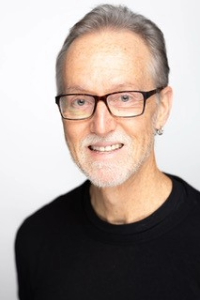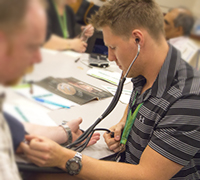School of Kinesiology

Associate Professor
Faculty of Health Sciences, Kinesiology
Abbotsford campus
Phone: 604-504-7441 ext. 4492
email David G.Dr. David G. (Dave) Harper is a science educator, researcher, and technology CEO. Educated from kindergarten to Ph.D. in BC, he is an advocate for education, science and technology, diversity and inclusiveness, environmental sustainability, and is passionate about the importance of critical reasoning and reasoned skepticism. He is the President and CEO of the Discovery Foundation, a registered charity that fosters the development and sustainability of the science and technology sector in BC, with a focus on equity, diversity, and inclusion.
Dave holds a BSc. and Ph.D. from the University of British Columbia in mathematical biofluiddynamics and completed post-doctoral fellowships at the Marine Biological Laboratory in Woods Hole and the University of Cambridge in comparative physiology. He is an Associate Professor of Kinesiology at the University of the Fraser Valley, where he teaches courses in Anatomy, Physiology, Pathology, and Contemporary Health issues. He is also UFV’s Director of Innovation and Entrepreneurship.
As a Visiting Scientist at the BC Cancer Research Centre, Terry Fox Lab, his current research focusses on the therapeutic benefits of ketogenic diets for women with metastatic breast cancer. He is on the Scientific Advisory Board of the Institute for Personalized Therapeutic Nutrition and is the author of BioDiet, an international bestseller about the therapeutic benefits of ketogenic diets and the new science of nutrition.
B.Sc.: University of British Columbia
Ph.D.: University of British Columbia
Visiting Scientist, BC Cancer Research Centre, Terry Fox Laboratories; Scientific Advisory Board, Canadian Clinicians for Therapeutic Nutrition; Executive Committee, The Health Educators of BC (Anatomy and Physiology Articulation Committee); Board, Discovery Foundation; Board, Student Biotech Network
Human nutrition
Human anatomy and physiology
Pathophysiology
Contemporary health issues (active health)
Human Nutrition, Anatomy, Physiology, and Pathology, Contemporary Health
Therapeutic benefits of ketogenic diets for preventing and treating chronic disease
Design-Thinking Innovation
Leadership theory and practice
Keynote speaker: Keto Salt Lake(Salt Lake City, Utah, 2021)
Keynote speaker: Keto Salt Lake (online, 2021)
Keynote speaker (x 2): United Nations Development Program, Eastern Europe (online 2021)
Speaker: UFV HR workshop on nutrition (online 2021)
Panelist: UFV HR Fitness Challenge (online 2021)
Keynote speaker: Low Carb Denver (Denver, Colorado, 2020)
Keynote speaker: ACETECH Digital Summit (online, Vancouver, 2020)
Keynote Speaker: Type 2 Diabetes Summit (UK and Ireland 2019 – online)
Keynote speaker: Whole Human health Summit (Vancouver, 2019)
Panelist: Fraser Valley Tech Forum (Chilliwack, 2019)
Keynote workshop: Prospera Credit Union AGM
Invited speaker: Catalyst: BCTF Science Teachers (Kelowna, 2018)
Invited speaker: iCORD (Vancouver, 2017)
Invited speaker: Specialty Food Expo (Vancouver, 2017)
Invited speaker: UFV Mini-Lecture Series (2017)
Invited speaker: UFV Mini-Lecture Series (2015)
Invited Speaker: Canada-India Networking Initiative (2010)
Invited Speaker: Abbotsford Learning Plus (1998 – present)
Invited Speaker: Chilliwack Elder College (2000 – 2011)
Invited Speaker: West End Seniors’ Network (2007 – 2009)
Invited Speaker: Vancouver Parole Board (2005, 2006)
Invited Speaker: BCIT Biotechnology MBA program (2004)
Invited Speaker: Vancouver Dental Group Continuing Medical Education (2003)
Journals
BioDiet: The Scientifically Proven, Ketogenic Way to Lose Weight and Improve Your Health, Harper, D.G. and Drewery, D. (2019).
Harper, D.G. (2002). A New Paradigm for the Management of Online Learning in Higher Education. Proceedings of the Third International Conference on Information Communication Technologies in Education, Samos, Greece.
Ahlborn, B., Harper, D.G., Blake, R.W., Chapman, S., and Stafford, R. (1996). Experimental simulation of the thrust phases of fast-start swimming of fish. Journal of experimental Biology.
Kasapi, M., Domenici, P., Blake, R.W, and Harper, D.G. (1993). The kinematics and performance of the escape response in the knifefish, Xenomystis nigri. Canadian Journal of Zoology.71(1):189-195.
Harper, D.G. and Blake, R.W. (1991). Prey capture and the fast‑start performance of northern pike Esox lucius. Journal of experimental Biology. 155:175‑197.
Ahlborn, B., Harper, D.G., Blake R.W., Ahlborn, D., and Cam, M. (1991). Fish without footprints. Journal of theoretical Biology. 148: 521‑533.
Covell, J., Smith, M., Harper, D.G., and Blake, R.W. (1991). Skeletal muscle deformation in the lateral muscle of the intact rainbow trout, Oncorhynchus mykiss, during fast-start manoeuvres. Journal of experimental Biology. 156: 453‑466.
Harper, D.G. (1990). The mechanics and kinematics of fast‑starts of rainbow trout Oncorhynchus mykiss and northern pike Esox lucius. (Ph.D. thesis)
Harper, D.G. and Blake, R.W. (1990). Fast‑start performance of rainbow trout Salmo gairdneri and northern pike Esox lucius. Journal of experimental Biology. 150: 321‑242.
Harper, D.G. and Blake, R.W. (1989). A critical analysis of the use of high‑speed film to determine maximum accelerations of fish. Journal of experimental Biology. 142:465‑471.
Harper, D.G. and Blake, R.W. (1989). On the error involved in high‑speed film when used to evaluate maximum accelerations of fish. Canadian Journal of Zoology. 67:1929‑1936.
Harper, D.G. and Blake, R.W. (1988). Energetics of piscivorous predator‑prey interactions. Journal of theoretical Biology. 134: 59‑76.
Conference Proceedings
Harper, D.G. (2016). Evidence for a Long-Term, Anti-inflammatory Response to the Ketogenic Diet. 5th Global Conference for Ketogenic Therapies, Banff, Alberta.
Harper, D.G. (2016). Evidence for a Long-Term, Anti-inflammatory Response to the Ketogenic Diet. Canadian Society of Exercise Physiologists, Banff, Alberta.
Harper, D.G. (2007). E-Learning in Remote First Nations: The BC - Yukon First Nations' Health Network. Proceedings of the Association for the Advancement of Computers in Education (AACE) E-Learn Conference, Quebec City, Quebec.
Harper, D.G. (2007). BC-Yukon First Nations Health Network. Proceedings of the Association for the Advancement of Computers in Education (AACE) Ed-Media Conference, Vancouver, B.C.
Harper, D.G. (2007). Using Technology to Serve First Nations’ Post-Secondary Education. Canadian E-Learning Conference, University of Alberta.
Harper, D.G. (2007). Using Technology to Enhance the Success of First Nations Students. Making Connections: Learning and Research, University of BC (Okanagan), Kelowna, B.C.
Harper, D.G. (2007). Post-Secondary E-Learning for First Nations: the BC-Yukon First Nations’ Health Network. Canadian Aboriginal Science and Technology (CASTS) Conference, Calgary, Alberta.
Journals
Harper, D.G. Vitamin E-ducation. Natural Foods Network Magazine. May/June 2005.
Newspaper
Harper, D.G. Fix Faulty Food Guide. Vancouver Sun opinion article. 10 February 2018
Authored Books
Harper, D.G. (2014) BioDiet. Harper Health. (In editing) Harper, D.G. (2015) BioDiet. Harper Health (In progress)
Harper, D.G. (2002). Investing in Biotech: How to profit from the Biopharmaceutical Revolution. Raincoast Books, Vancouver. (This book twice made the best-sellers list for business books in Canada)
Edited Books
Harper, D.G. and Hirtz, S. (editors) (2008). E–Learning: Education for a Digital World. Commonwealth of Learning.
Letters to the Editor
Vancouver Sun – responding to Genetic engineering: The pushback against GMO foods (6 March 2015)
Globe and Mail – responding to Ottawa to take action on Sugar (16 July 2014)
Globe and Mail – responding to WHO to work on lowering recommended daily limit for sugar intake (5 March 2014)

The kinesiology program has not only exposed me to the theory, but has equipped me with a vast amount of practical knowledge, applications, and tools to use in the future. This program has led me to pursue a career in medicine where I can have a positive impact on other and help them live a healthy life.